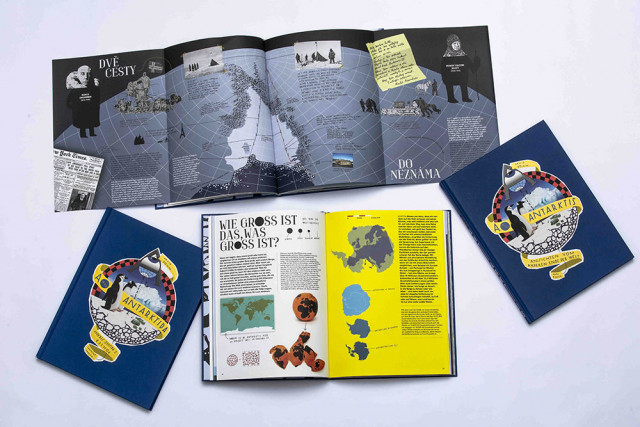Czech literature for children and youth, a book market segment that has long been popular abroad, has achieved another extraordinary success this year: several Czech and German awards for David Böhm’s book A is for Antarctica: View from the Other Side (A jako Antarktida: Pohled z druhé strany, 2019).
Several institutions and supporters pulled together to publish the book which meant that the author could actually visit Antarctica before creating his work – and he took his sons, Jáchym and Oliver, with him. They were sent on the journey by the German publisher Hans Koch that also sponsored the book’s translation into German, carried out by the experienced translator Lena Dorn.
“Karl Rauch Verlag has already published two of David’s books. We talked about what other projects he would like to make come true. It was clear that he was particularly interested in Antarctica and that he even had a friend who organizes sailing trips to Antarctica and he would like to try it one day. I found his story so exciting that an idea arose to send David and his two sons on a trip to Antarctica for a few weeks. The journey then became the basis for the book,” Hans Koch describes the idea of Antarctica as the main heroine of the new book for children.
In Czech conditions, it is difficult to imagine such an extraordinary step. However, the German publisher was not afraid of failure: “I never had any doubts about the project, maybe I was just worried whether the book sales would pay off the relatively high costs to create it. David’s first sketches convinced me completely, and I was sure that an amazing book would be created.”
These expectations were met, as A is for Antarctica won an award for a book for children and youth in the Czech Republic, too: Magnesia Litera and Zlatá stuha (The Golden Ribbon) in the literary category of non-fiction for children and youth. What is perhaps even more crucial is the extraordinary reception in Germany: the book has won the German Children’s Literature Award in the non-fiction category (Deutscher Jugendliteraturpreis – Sachbuch) and another award for Lena Dorn’s translation.
“It is the most well-known prize for literature for children and youth in Germany, awarded annually by the Federal Ministry for Family Affairs, Senior Citizens, Women and Youth in Frankfurt during the book fair. Everyone knows it. I do not know how to put it any other way; it is a very important prize, and I am very happy that I could be a part of this project,” said the translator.
Hans Koch agrees with Lena Dorn and adds that “prizes are always a kind of confirmation that I, as the publisher, have made a good decision. I was delighted that David won the Magnesia Litera and the German Children’s Literature Award. Both prizes show that we have made an exceptional book that, with regard to its topic, was published at the right time.”
Translating a book like this from Czech into German is naturally not easy: “The most difficult thing for me was a penguin’s demonstration against waste, or rather its motto – I feel that in German, we do not have a similar tradition of witty, funny and short slogans for political demonstrations. Besides that, it was definitely important to try to make the scientific information accurate.” Lena Dorn has already cooperated with the Rauch publishing house on How to Make a Gallery (Jak se dělá galerie, 2017).
The author himself was not sure whether the book he had composed “still holds together, so I am glad it makes sense to someone else as well”.
Besides the awards from experts, it is also important that the translation is popular with the German audience. “It is a book that looks different from other books for children and youth. It is distinctive, it surprises, and when you look at it, you just can’t put it aside. Many reviewers have noticed this, and bookstore visitors also share this experience. The success of the book is growing slowly, but the awards also contribute to people’s interest in the book. We have already had to make a second reprint and now we have just started another one. I think we will be selling the book for a long time, because it will be topical also in the future,” believes Hans Koch.
The German and Czech versions were published at the same time, and the publishing house has so far sold licenses to China, South Korea and Slovakia. Applicants from the USA, England and Spain are also seriously interested. According to Lena Dorn, the book has a high chance of success because it is for the whole family: “Everyone will find something in it – either penguins, geographical or historical information, or a philosophical and artistic challenge to understand why we look at the world the way we do. It is also good for discussing the climate crisis, as Antarctica is an endangered continent, and several times it has been mentioned in newspapers as the only part of the world without coronavirus.”
David Böhm is already working on another project, a book on urbanism by Osamu Okamura. “At the moment, we are finishing illustrations with Jirka Franta and Pavel Horák. We have been creating models of the cities that Pavel took photos of, so it was a completely different approach than usual. And I have a few ideas for some of my other books, but so far it is at the stage of collecting observations and notes, I’ll see what will finally come out of it.”
Lena Dorn is currently translating Milada Rezková’s book about fear Don’t be afraid! (Neboj, neboj!), which will be published by the Helvetiq publishing house in spring 2021.



